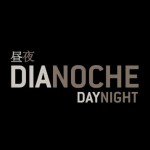Blog del Instituto Cervantes de Dublín
Torre Martello
Paul Gaffney makes the path by walking | Paul Gaffney hace camino al andar
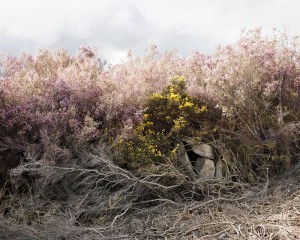 As every year, PhotoIreland and Instituto Cervantes bring you a new exhibition. This time you can enjoy We make the path by walking by artist Paul Gaffney. You can visit the exhibition from July 10th to July 30th. The opening hours are : Mon- Thur 12 am-7pm and Fri 10am-2pm.
As every year, PhotoIreland and Instituto Cervantes bring you a new exhibition. This time you can enjoy We make the path by walking by artist Paul Gaffney. You can visit the exhibition from July 10th to July 30th. The opening hours are : Mon- Thur 12 am-7pm and Fri 10am-2pm.
Over the past year Paul Gaffney has walked over 3,500 kilometres throughout Spain, Portugal and the south of France, with the aim of creating a body of work which explores the idea of walking as a form of meditation. His intention has been to create a series of quiet, meditative images, which would evoke the experience of being immersed in nature and capture the essence of the journey. The images seek to engage the viewer in this walk, and to communicate a sense of the subtle internal and psychological changes which one may undergo while negotiating the landscape.
Paul Gaffney is a Dublin-based artist who has recently completed an MFA in Photography at the University of Ulster in Belfast. His project ‘We Make the Path by Walking’ has been shortlisted for the European Publishers Award for Photography 2013, and also won the Johnsons-Photopia prize at this year’s Format Festival in Derby, England. His work has been exhibited in numerous locations throughout Ireland and the UK, including the Gallery of Photography, Cambridge University, Host Gallery (London) and Third Floor Gallery (Cardiff).
Como todos los años, PhotoIreland y el Instituto Cervantes te traen una nueva exposición. Esta vez puedes disfrutar de Se hace camino al andar del artista Paul Gaffney. La exposición tendrá lugar entre el 10 y el 30 de julio y las horas de visita son lunes a jueves de 12:00 a 19:00 y los viernes de 10:00 a 14:00.
Durante el último año Paul Gaffney ha recorrido más de 3.500 km por España, Portugal y el sur de Francia con el propósito de captar imágenes y momentos que exploren la noción de caminar como vía de meditación. Su intención ha sido crear una serie de imágenes serenas y meditativas que evoquen la experiencia de sentirse inmerso en el entorno y que capturen la esencia del viaje. Las imágenes pretenden hacer partícipe al espectador de este recorrido y reflejar los posibles y sutiles cambios, íntimos y psicológicos, que se viven al atravesar los parajes naturales que le rodean.
Paul Gaffney es un artista afincado en Dublín que ha terminado recientemente un Máster en Bellas Artes en fotografía de la Universidad de Úlster, Belfast. Su proyecto We Make the Path by Walking (Se hace camino al andar) ha sido nominado para el premio EPAP 2013 (European Publishers Award for Photography), y ha sido galardonado con el premio Johnsons-Photopia del Festival Format de Derby, Inglaterra, de este año. Su trabajo se ha expuesto en numerosas localidades de Irlanda y Reino Unido, incluidas la Gallery of Photography, (Universidad de Cambridge), la Host Gallery (Londres) y la Third Floor Gallery (Cardiff).
Cine | Film screening: Salve Melilla + La boda de Mawla
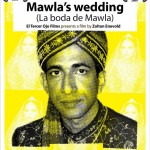 Hoy finaliza el ciclo de cine Los límites de la frontera en colaboración con PhotoIreland. Os ofrecemos dos documentales que no os podéis perder. En Salve Melilla, Carlos Rubiales se convierte, un año más, en el hombre de la Semana Santa. El presentador del programa religioso es el Cruz de guía que la televisión de Melilla pone en antena con motivo de la fiesta religiosa.
Hoy finaliza el ciclo de cine Los límites de la frontera en colaboración con PhotoIreland. Os ofrecemos dos documentales que no os podéis perder. En Salve Melilla, Carlos Rubiales se convierte, un año más, en el hombre de la Semana Santa. El presentador del programa religioso es el Cruz de guía que la televisión de Melilla pone en antena con motivo de la fiesta religiosa.
La boda de Mawla cuenta la historia de Mawla, que es de Bangladesh y vive en Madrid. Tiene trabajo y muchos amigos, pero su sueño es formar una familia. Después de siete años decide volver por primera vez a su país, con el fin de encontrar novia y casarse.
Te esperamos en el Café Literario hoy a las seis.
Today is the last session of the cinema series The limits of the frontiers in cooperation with PhotoIreland. Two documentaries will be shown today.
In Salve Melilla, Easter arrives at Mellilla. Carlos Rubiales becomes, another year, Easter man. He is the presenter of the religious programme Cruz de Guía (Guiding Cross) that Melilla’s Television broadcasts.
La boda de Mawla is about a young man from Bangladesh living inMadrid (Spain). He has a job and plenty of friends but his dream is to have a family. For the first time after seven years he decides to return to his country in search of a bride to get married.
We hope to see you today at 6pm at Café Literario.
Film screening | Cine: Día noche + En la línea
Cine documental hoy a las seis en el Café Literario. Os ofrecemos un programa doble con las proyecciones de Día noche y En la línea dentro del ciclo de cine Los límites de la frontera en cooperación con PhotoIreland.
Dia noche ocurre un sábado cualquiera en el sur de California. Adam, un norteamericano de clase media-baja, se despide de su mujer e hijos para acometer su tarea semanal. Un cometido que entraña sacrificios pero que él desempeña con la sólida convicción de sus ideales.
En la línea oscila entre el vértigo que moldea el día y la noche en la capital china seguimos durante un año a un motero danés que sueña con abrir un bar rockabilly a orillas del lago Houhai, a una estudiante del norte del país que deambula entre dos modelos culturales, a un joven de Alaska que se esconde bajo la tierra de Pekín y a un periodista español empeñado en dar con la tecla que desenvuelva el misterio que le rodea. Su cotidianidad nos descubrirá una China corriente y cercana a trasmano del tópico.
Documentary cinema today at 6pm at Café Literario. There will be two films today: Day Night and On the line. They are part of The Limits of the Frontiers series in cooperation with PhotoIreland.
Day Night happens during an ordinary Saturday in Southern California. Adam, an American lower-middle class man, bids farewell to his wife and children to undertake his weekly chore. A task implying sacrifices, but that he accomplishes with the solid conviction of his ideals.
On the line tells the vertigo that shapes day and night in China’s capital, this documentary follows, over a year, the lives of a Danish biker who dreams of opening a rockabilly bar by Houhai Lake, a student from the North wandering between two cultural models, ayoung man from Alaska who hides underground inBeijing, and a Spanish journalist seeking to unravel the mystery that surrounds him. Their everyday lives reveal a China that, contrary to thecliché, is ordinary and close.
Film screening | Cine: Diamond Inside
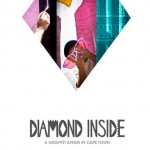 Diamond Inside narra el viaje a CapeTown del colectivo Boa Mistura donde entrarán en contacto con artistas y vecinos de los barrios marginales de la ciudad, como Khayelitsa o Woodstock, con el objetivo de pintar murales que inspiren un cambio en la comunidada través del arte. El documental recala las experiencias personales de varios habitantes que luchan para generar ese cambio entre la población más desfavorecida. Esta es la tercera sesión del ciclo Los límites de la frontera, en cooperación con PhotoIreland. La proyección es hoy a las seis en el Café Literario.
Diamond Inside narra el viaje a CapeTown del colectivo Boa Mistura donde entrarán en contacto con artistas y vecinos de los barrios marginales de la ciudad, como Khayelitsa o Woodstock, con el objetivo de pintar murales que inspiren un cambio en la comunidada través del arte. El documental recala las experiencias personales de varios habitantes que luchan para generar ese cambio entre la población más desfavorecida. Esta es la tercera sesión del ciclo Los límites de la frontera, en cooperación con PhotoIreland. La proyección es hoy a las seis en el Café Literario.
Diamond Inside is the journey of the B oa Mistura collective to Cape Town. On their arrival they will meet artists and people from marginalised neighbourhoods in the city, such as Khayelitsa or Woodstok. Their goal is to draw murals that inspire change through art in the comunity. This documentary recounts personal experiences of various dwellers who struggle to generate that change amongst the most underpriviledged sector of the population. This is the third session of The Limits of Frontierscinema series that has been organized in cooperation with PhotoIreland. The screening is today at 6pm at Café Literario.
oa Mistura collective to Cape Town. On their arrival they will meet artists and people from marginalised neighbourhoods in the city, such as Khayelitsa or Woodstok. Their goal is to draw murals that inspire change through art in the comunity. This documentary recounts personal experiences of various dwellers who struggle to generate that change amongst the most underpriviledged sector of the population. This is the third session of The Limits of Frontierscinema series that has been organized in cooperation with PhotoIreland. The screening is today at 6pm at Café Literario.
Film screening | Cine: Entre líneas + Desplazados
Hoy os ofrecemos dos interesantes piezas del cine documental más actual en la segunda sesión del ciclo Los límites de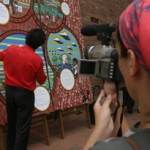 la frontera, en colaboración con PhotoIreland. No olvidéis que como siempre la proyección será a las 18:00 en el Café Literario.
la frontera, en colaboración con PhotoIreland. No olvidéis que como siempre la proyección será a las 18:00 en el Café Literario.
Entre líneas ofrece una mirada única e íntima a la identidad australiana a través de los ojos críticos de un artista aborigen urbano. Adam Hill realiza un viaje en busca de su identidad a través de su arte, en una intensa trayectoria personal y artística. Adam se enfrenta a sus frustraciones y a su compromiso con su propia identidad aborigen y lucha contra las opiniones, no sólo de la sociedad que le rodea, sino también de la gente más cercana a él. Las contradicciones y frustraciones de Adam no son exclusivas de él o de los aborígenes o de los australianos, sino que son universales.
La necesidad y el derecho de pertenecer a un lugar y de definir la propia identidad es una lucha que se hace ahora más fuerte que nunca con los retos de la globalización. Las estructuras de poder imponen o niegan la identidad y este documental resalta esta lucha del individuo.
We show you today two interesting pieces of the current documentary cinema in the second session of the film series The limits of frontiers in cooperation with PhotoIreland. Don´t forget that the screening will is at 6pm at Cafe Literario .
Between the lines offers a unique and intimate view of Australian identity through the critic eyes of an Aboriginal urban artist. Adam Hill embarks on an intense personal and artistic journey through his artwork in search of his identity. Adam faces his frustrations and his commitment with his own aboriginality and struggles with the opinions of both the society that surrounds him and of the people closest to him. Adam’s contradictions and frustrations are not exclusive to him, to the Aboriginal Australians or the Australians. They are universal. The yearning and the right to belong to a place and to define one’s own identity is a struggle made harder than ever with the challenges faced by globalisation. The structures of power impose or deny identity, and this documentary emphasises this individual’s struggle.
New Exhibition | Nueva exposición: El otro lado del alma
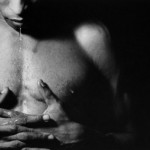 Por tercer año consecutivo, el Instituto Cervantes de Dublín participa en el Festival PhotoIreland. La edición 2012 lleva por título Migrations: Diaspora & Cultural Identity (Migraciones: Diáspora & Identidad cultural). Dentro de esta temática presentamos la exposición El otro lado del alma.
Por tercer año consecutivo, el Instituto Cervantes de Dublín participa en el Festival PhotoIreland. La edición 2012 lleva por título Migrations: Diaspora & Cultural Identity (Migraciones: Diáspora & Identidad cultural). Dentro de esta temática presentamos la exposición El otro lado del alma.
En El otro lado del alma nos encontramos con una serie de fotógrafos contemporáneos cubanos que investigan la temática religiosa y en concreto las religiones sincretistas con raíces en los cultos africanos importadas a la isla hace cientos de años por esclavos, desde muy diferentes perspectivas, mostrando una interpretación individual sobre la memoria espiritual colectiva de la nación.
Aunque la fotografía y el videoarte cubano actual se mueven en la esfera de los movimientos internacionales, mucho de los artistas cubanos siguen mostrando en sus fotografías y en sus vídeos que la tradición cubana sigue estando profundamente arraigada en ellos. Así, en muchas de las obras que se producen actualmente podemos apreciar la influencia de una profunda temática cubana.
La exposición estará abierta del 05/07/2012 al 31/08/2012.
El horario de visita es de lunes a jueves entre las 14:00 y las 19:00. Los viernes de 10:00 a 14:00. Cierra los sábados, domingos y bank holidays.
For the third consecutive year, Instituto Cervantes Dublin takes part in PhotoIreland Festival. The 2012 edition’s title is “Migrations: Diaspora & Cultural identity”.
In this context we introduce El otro lado del alma (The other side of the soul). This exhibition showcases various contemporary Cuban photographers who research religious themes and, specifically, syncretistic religions with roots in African cults that were imported in the island centuries ago by slaves. These photographers portray a personal interpretation of the collective spiritual memory of the nation from very different perspectives.
Although both Cuban photography and video art revolve around international movements, many Cuban artists still portray an ingrained Cuban tradition. We can therefore perceive a profound Cuban theme influence in many works produced at present.
The exhibition will be open from July 5th to 31st August 2012.
The visiting hours are Mon-Thu.: 2-7pm. Fri: 10am-2pm. Closed Sat, Sun, bank holidays
Film screening | Cine: En enero quizás + Distancias
Esta tarde comienza el ciclo de cine Los límites de la frontera, organizado con PhotoIreland . Para la primera sesión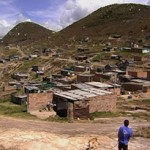 os hemos preparado un programa doble.
os hemos preparado un programa doble.
Primero se proyectará Distancias.
La historia: Un grupo de refugiados del Congo está bloqueado en Rabat. La frontera con España les impide cruzar a Europa. En una remota habitación en la periferia de la ciudad ensayan una pieza de teatro sobre su propia experiencia. Una obra imperfecta, inacabada. La vida real se confunde con su representación.
Entre ellos, Apollinaire cuenta, frontalmente, un eterno viaje de final incierto. Archivos televisivos muestran migrantes expulsados al desierto, obligados a empezar de nuevo. Rostros que han perdido sus nombres. Y detrás permanecen los espacios vacíos de lo sucedido. Huellas silenciosas que revelan su historia como nuestra.
Y seguidamente os ofrecemos En enero quizás.
La historia: Rumania ha entrado en la Unión Europea el 1 de enero de 2007. En la misma fecha se estableció una moratoria de dos años a la libre circulación de trabajadores procedentes de Rumania. En consecuencia de esta medida, hasta el 1 de enero de 2009, muchos rumanos que se encuentran en España no pueden trabajar por cuenta ajena pero tienen el derecho de residencia… Daniel es un rumano que intenta sobrevivir en las calles de Barcelona y aunque sin abrigo mantiene la esperanza que en enero de 2009 conseguirá encontrar un trabajo y reorganizar su vida.
Os esperamos hoy a las 18:00 en el Café Literario.
This evening the new cinema series The limits of the frontiers starts. It is organized in cooperation with PhotoIreland. A group of refugees from Congo are stuck in Rabat. The Spanish borderline prevents them from entering Europe. In a remote room on the outskirts of the city they rehearse a theatre piece based on their own experiences. An imperfect, unfinished piece. Boundaries between real life and the stage are blurred.
First we will show Distancias.
The story: Apollinaire recounts, face to face, the never-ending journey with an uncertain conclusion. Television archive images show us emigrants forced into the desert to start their journey once more. Faces without a name. Left behind are the empty spaces of what has already happened. Silent tracks that reveal their story as our own.
The second screening is En enero quizás.
The story: When Romania joined the European Union on the 1st of January 2007, the Spanish government established a two-year moratorium to restrict freedom of movement for Romanian workers. Following this measure, many Romanians with residency status in Spain were prevented from working in Spain until the 1st of January 2009. Daniel is a homeless Romanian that struggles to survive in the streets of Barcelona and believes that he will find a job in January 2009 and change his life.
We hope to see you today at 6pm at Café Literario.
